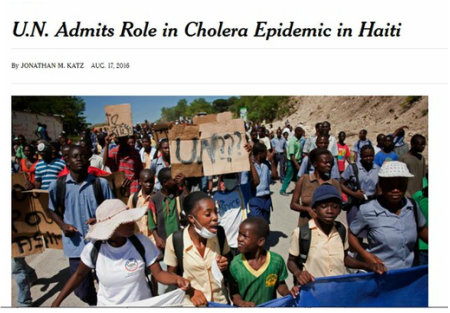
It’s hard to mention Haiti without talking about the long list of tragedies the country has had to endure. Military coup, the devastating 2010 earthquake, a persistent cholera outbreak, and now, the ravages of Hurricane Matthew.
The seeming onslaught of disasters, both natural and man-made, has made Haiti one of the most fertile feeding grounds for the big business of foreign aid. With the death toll from the hurricane surpassing the 1,000 mark, aid agencies are flocking like vultures into the poverty stricken country, cranking up their machinery to “raise funds” in the name of the Haitian people.
One news report claimed that there are over 10,000 charity organizations operating in Haiti. 10,000. Let that number sink in.
If this is true, then, with a population of 10 million, it means that there’s one aid organization for every 1,000 persons living in the poorest country in the Western Hemisphere. Collectively, they raise money in the billions. Yet, despite all the aid pouring in, the country remains in dire straits, all the while at the mercy of both internal and external corruption and the destructive forces of Mother Nature.
In June 2015, a media investigation uncovered that the American Red Cross, with the half billion dollars it raised for the Haitian people following the 2010 earthquake, had built only six permanent houses. No evidence was found to back up the NGO’s claim of providing housing for more than 100,000 people. Instead, millions of dollars went into “administrative costs”.
|
And they are not alone. The now defunct YELE charity run by one of Haiti’s most famous sons, singer Wyclef Jean, reportedly mishandled $16 million in donations after the 2010 earthquake, spending more than $9 million on “offices, salaries, consultants’ fees and travel.”
Around the world, charity is a thriving business, especially in developing and impoverished countries. Aid agencies and big name foundations raise money purporting various causes – to provide healthcare, food, housing and other vital necessities to the less fortunate. What has come to light time and time again is that for some of these organizations, a large percentage of the money they collect is allocated to administrative costs to include the salaries of foreign sub-contractors rather than employing local people who have the talent and skills they need. Just imagine, if 10% of the aid organizations operating in Haiti actually dedicated their resources to providing sustainable jobs and other activities designed to empower Haitians to lift themselves out of poverty.
But as the first free nation in the region, Haiti has paid a heavy price for its sin – daring to revolt in 1791 against the brutal colonial reign that treated black people as lesser human beings. From then up to today, various external agencies and individuals have consistently interfered in the country’s attempts to truly exercise their freedom, and create a sustainable economic environment where the Haitian people can prosper. Instead, outside agents actively influence Haiti’s elections to protect their own interests, then attempt to cover up their misdeeds under the mask of foreign aid. Under this pretext, the country has become a dumping ground for substandard goods that stifles the local economy and creates a welfare culture that deprives people of much needed opportunities to improve their own lives.
Then there’s the tragic spread of cholera, for which the United Nations quietly admitted this past August that its peacekeepers likely “played a significant role” in the outbreak. In fact, the Haitian people had insisted all along that UN peacekeepers, who arrived in the aftermath of the 2010 earthquake, had brought the disease with them, claiming 10,000 lives. But there was no public outcry when this hushed acknowledgment by the UN was revealed (perhaps strategically) as the rest of the world was captivated by the Olympic Games. Scenes of filthy tent cities and unsanitary conditions paraded around in the media do a much better job of convincing the world that the present cholera outbreak is the fault of the Haitian people.From where I sit, it seems that many people have been exploiting Haiti’s poverty for their own benefit. Even the UN, despite admitting to its role in the cholera outbreak has firmly denied any form of compensation to the families of those who’ve suffered, while at the same time cranking up its “aid efforts” for Hurricane Matthew recovery.
Clearly it is in some people’s interest for Haiti to remain poor. But I am hopeful that the people of Haiti will follow through with a decision to work with local NGOs to rebuild the country, and that this will not be upended by foreign interests itching for private contracts and dumping markets for their substandard goods.
Give the jobs to the Haitian people to rebuild their communities. Encourage them to buy the goods that are available locally to build their economy. And as Jamaica offers its own help to our neighbours in need, let us also vow to resist all attempts to further exploit their misfortune.